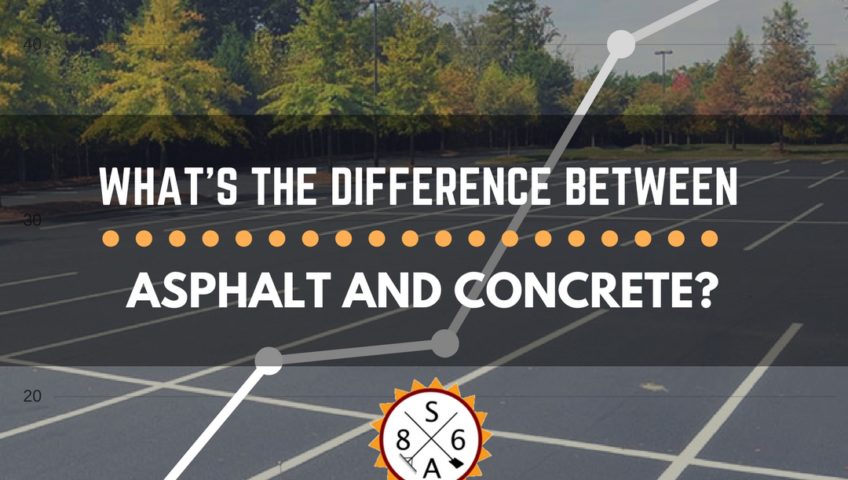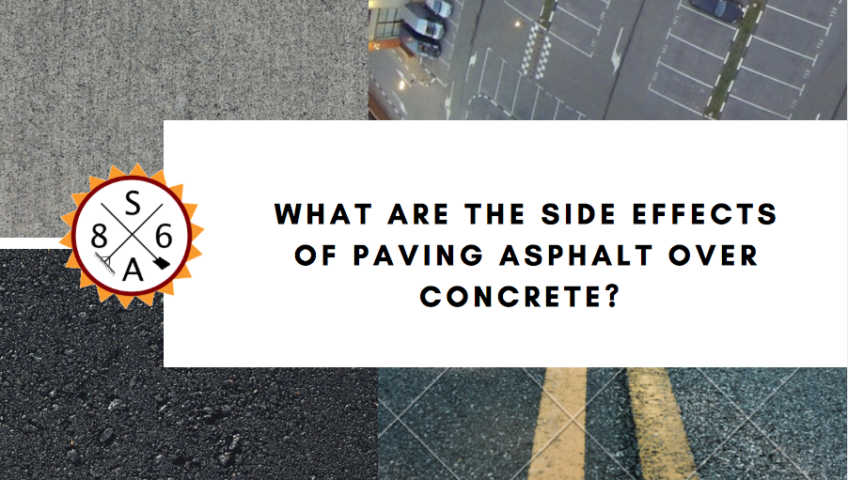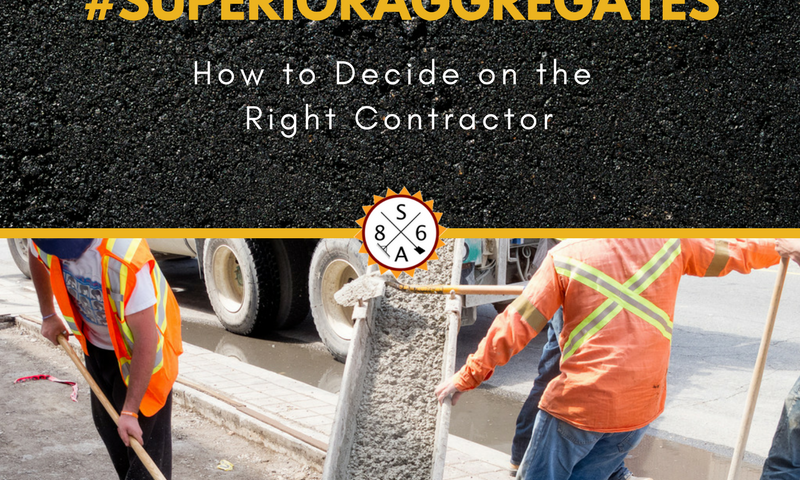
What’s the Difference Between Asphalt and Concrete?
Asphalt and concrete are both viable hard surface options for parking lots and driveways, but despite what many may believe, the two are not the same. Yes, there are similarities, such as the importance of a solid base, basic material composition and the need to adequately cure. But to help you make a more educated decision for your refinishing needs, we’ve outlined the top 10 key differences between concrete and asphalt. Have a look:
- Longevity: Concrete can usually last upwards of 40 years, while asphalt has a lifespan of about half of that.
- Durability: To piggyback off the last point in terms of longevity, concrete tends to be more durable than asphalt, which helps it to last longer.
- Aesthetics: Concrete tends to be a lot more versatile of a material than asphalt. For instance, it can be stamped, comes in various colors and has an assortment of finishes available. Asphalt on the other hand is a little less aesthetically pleasing. It comes primarily in black and no finishing options are available.
- Cost: Cost is an important aspect of any project, and a new driveway or parking lot is certainly no exception. On that note, asphalt has a tendency to be cheaper, typically costing anywhere from $2.50 to $4 per square foot. Concrete tends to range from $4 to $6 a square foot.
- Climate considerations: Concrete is generally better in warm climates and asphalt in colder climates. That’s because concrete has a tendency to crack in freezing temperatures and can be damaged by salt. Asphalt, on the other hand, tends to soften in hot temperatures, potentially leading to deformation. Asphalt can get very hot to the touch in warm, sunny climates as well.
- The adhesive: One of the biggest differences between concrete and asphalt is the adhesive that binds the mineral, stone and sand materials together. In concrete, the adhesive is cement. In asphalt, it’s tar.
- Cure time: Concrete takes a few days to cure before it can be driven on, while asphalt takes just a few hours.
- Resurfacing: Asphalt can be resurfaced to give the lot or driveway a new top coat. Resurfacing isn’t possible with concrete.
- Crack repair: In order to repair cracks, stains or deformations, asphalt can be resurfaced. Standalone cracks and holes can also be easily repaired, with the end product blending in fairly well with the rest of the lot or driveway. This isn’t the case with concrete, as crack repairs are generally far more obvious and potentially unsightly.
- Maintenance: It’s recommended that asphalt lots or driveways be resealed once every three to five years to extend operational use. This is easy to do and doesn’t require any special tools or products. Good maintenance can extend the life of asphalt surfaces. Concrete doesn’t have to be sealed to last, as consumers typically choose to seal a concrete driveway to enhance its appearance.
As you can see, concrete and asphalt are far from the same material, and the differences that we’ve listed above are all important considerations to note when you’re deciding on your next resurfacing project.
So what is best for your parking lot or driveway – asphalt or concrete?
Asphalt and concrete are both viable hard surface options for parking lots and driveways, but despite what many may believe, the two are not the same. Yes, there are similarities, such as the importance of a solid base, basic material composition and the need to adequately cure. But to help you make a more educated decision for your refinishing needs, we’ve outlined the top 10 key differences between concrete and asphalt. Have a look:
- Longevity: Concrete can usually last upwards of 40 years, while asphalt has a lifespan of about half of that.
- Durability: To piggyback off the last point in terms of longevity, concrete tends to be more durable than asphalt, which helps it to last longer.
- Aesthetics: Concrete tends to be a lot more versatile of a material than asphalt. For instance, it can be stamped, comes in various colors and has an assortment of finishes available. Asphalt on the other hand is a little less aesthetically pleasing. It comes primarily in black and no finishing options are available.
- Cost: Cost is an important aspect of any project, and a new driveway or parking lot is certainly no exception. On that note, asphalt has a tendency to be cheaper, typically costing anywhere from $2.50 to $4 per square foot. Concrete tends to range from $4 to $6 a square foot.
- Climate considerations: Concrete is generally better in warm climates and asphalt in colder climates. That’s because concrete has a tendency to crack in freezing temperatures and can be damaged by salt. Asphalt, on the other hand, tends to soften in hot temperatures, potentially leading to deformation. Asphalt can get very hot to the touch in warm, sunny climates as well.
- The adhesive: One of the biggest differences between concrete and asphalt is the adhesive that binds the mineral, stone and sand materials together. In concrete, the adhesive is cement. In asphalt, it’s tar.
- Cure time: Concrete takes a few days to cure before it can be driven on, while asphalt takes just a few hours.
- Resurfacing: Asphalt can be resurfaced to give the lot or driveway a new top coat. Resurfacing isn’t possible with concrete.
- Crack repair: In order to repair cracks, stains or deformations, asphalt can be resurfaced. Standalone cracks and holes can also be easily repaired, with the end product blending in fairly well with the rest of the lot or driveway. This isn’t the case with concrete, as crack repairs are generally far more obvious and potentially unsightly.
- Maintenance: It’s recommended that asphalt lots or driveways be resealed once every three to five years to extend operational use. This is easy to do and doesn’t require any special tools or products. Good maintenance can extend the life of asphalt surfaces. Concrete doesn’t have to be sealed to last, as consumers typically choose to seal a concrete driveway to enhance its appearance.
As you can see, concrete and asphalt are far from the same material, and the differences that we’ve listed above are all important considerations to note when you’re deciding on your next resurfacing project.
So what is best for your parking lot or driveway – asphalt or concrete?


